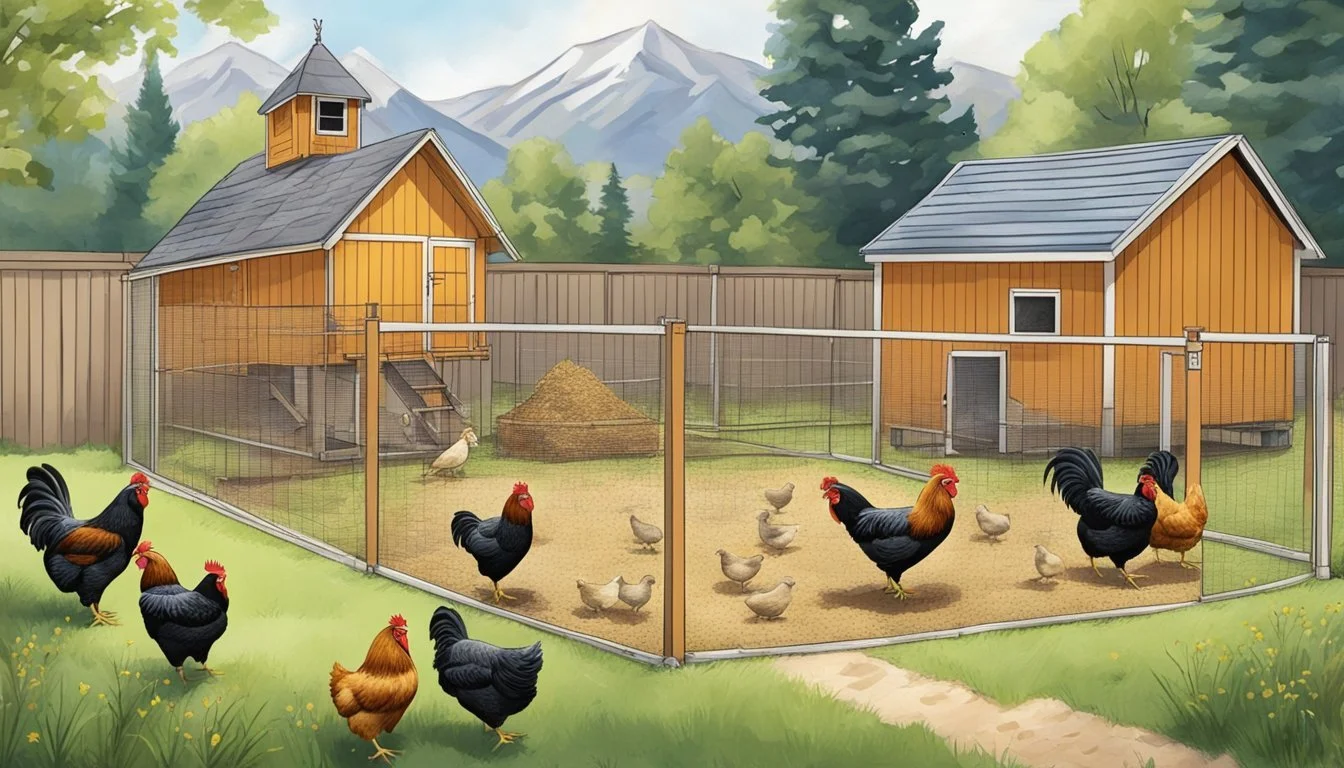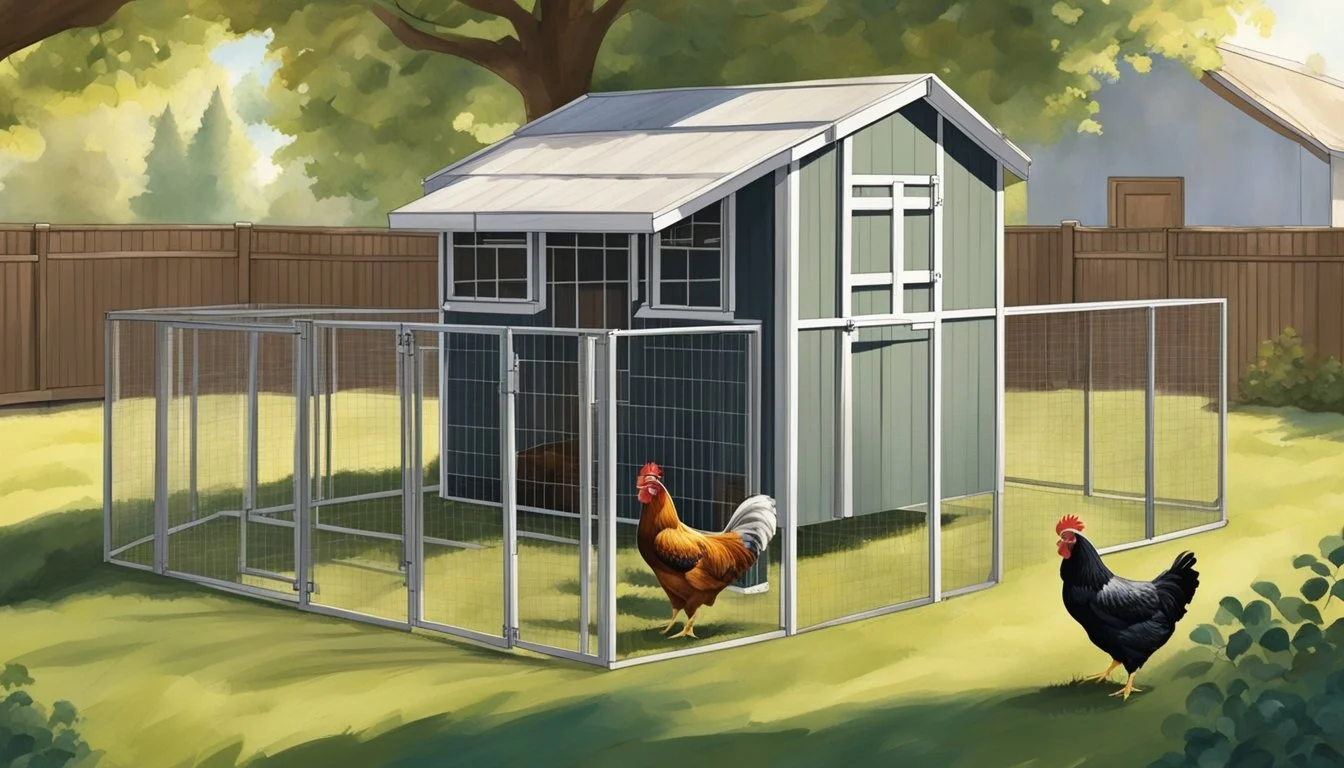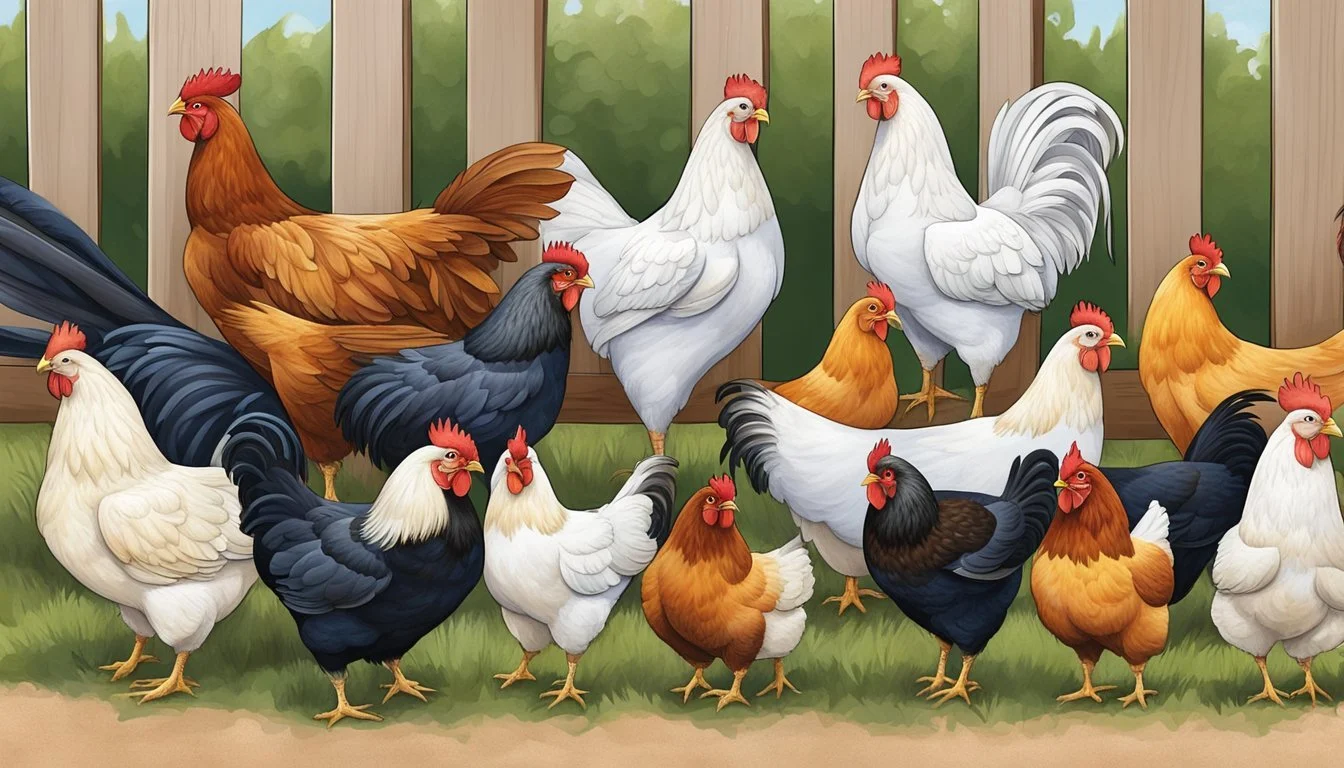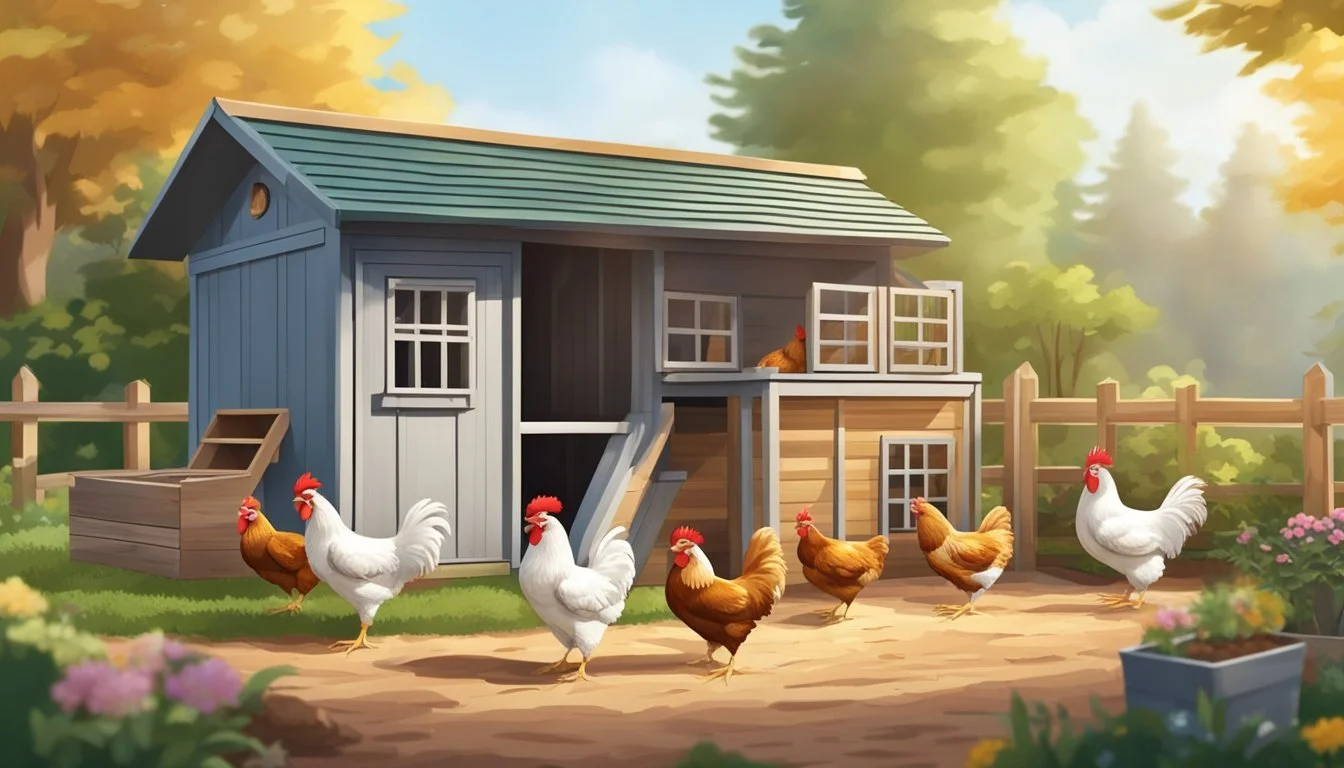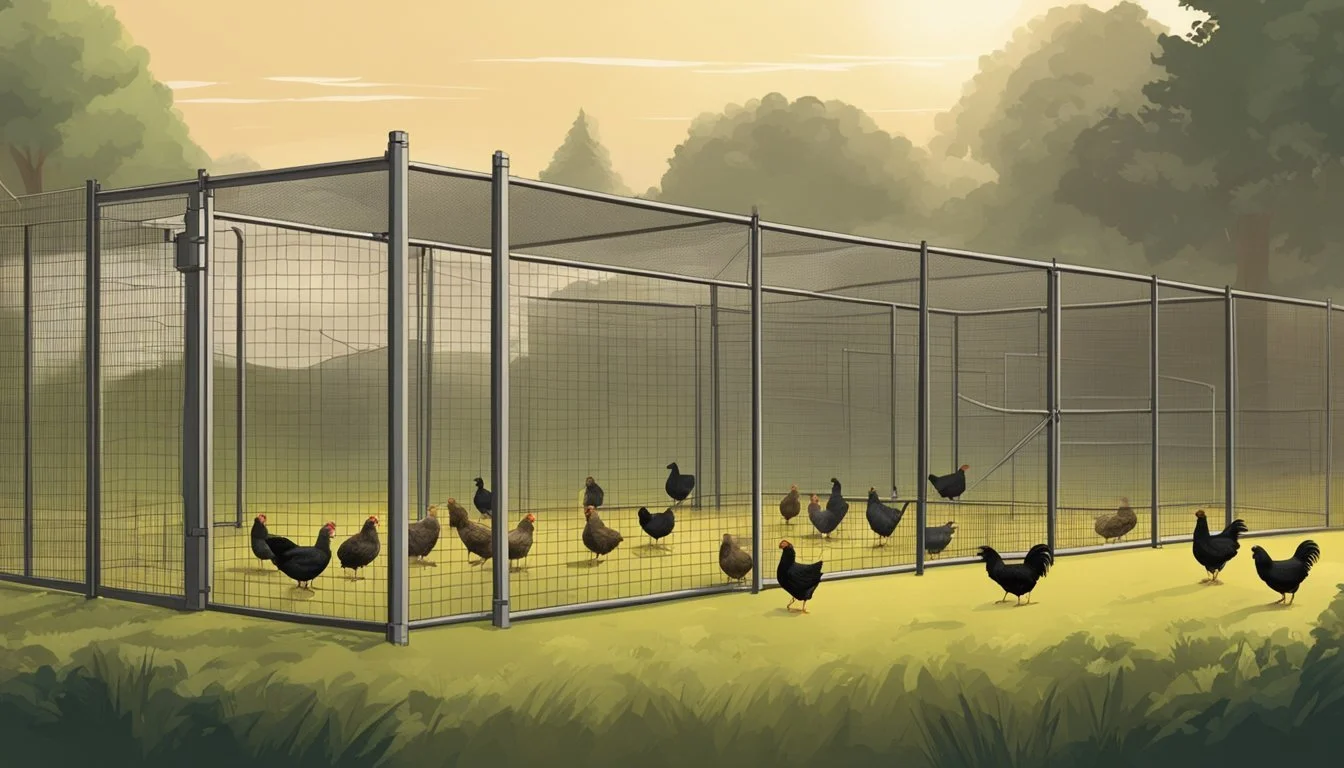Keeping Backyard Chickens in Provo, UT
Essential Guidelines for Urban Poultry Farming
Keeping backyard chickens has become an increasingly popular hobby amongst residents in Provo, Utah, where city ordinances have been created to manage urban poultry farming. The interest in raising chickens is often motivated by the desire to produce one's own eggs, reduce food waste, and engage in a more sustainable lifestyle. Provo city allows the keeping of hen chickens in residential zones under specified conditions, aligning with a nationwide movement towards urban agriculture and self-sufficiency.
Under Provo's regulations, the number of chickens permitted on a property is scaled in accordance with the size of the residential lot. Properties must be a minimum of 6,000 square feet to host these birds, and roosters are not permitted, mitigating noise concerns. It is crucial for residents to comply with these guidelines to ensure harmony with neighbors and adherence to local laws. These measures reflect a balance between the interests of chicken enthusiasts and the residential community at large.
Residents interested in embarking on the journey of raising backyard chickens need to be well-informed about the specific requirements, such as cooping standards, space requirements, and limitations on the number of chickens allowed. Staying updated on any changes to local ordinances is also key, as Provo's approach to urban chicken farming may evolve with time and experience. Successful backyard chicken keeping relies not only on understanding and meeting legal requirements but also on responsibly managing and caring for the chickens to ensure their well-being and productivity.
Provo City Regulations for Backyard Chickens
Residents in Provo, UT, who wish to keep backyard chickens must adhere to specific local ordinances. Compliance helps maintain a harmonious community and avoids potential fines.
Understanding Local Chicken Laws
Provo City's chicken laws are designed to ensure public health and neighborhood compatibility. It is illegal for chickens to roam outside their coop or enclosed area, as they must be confined to prevent potential nuisances. The local government has established regulations that govern how many chickens one can keep, the coop's location, and how to maintain hygiene and safety.
Permit Process and Requirements
To legally keep chickens, residents must obtain a chicken permit. Provo City's permit process is straightforward and can be handled online or at the city offices. Requirements for obtaining a permit include proof of compliance with city ordinances and zoning laws, and proper preparations for chicken keeping. Not adhering to permit requirements could result in fines or the revocation of the permit.
Zoning and Property Restrictions
Provo's zoning laws dictate that chicken coops must be positioned at least 15 feet from the property line, and within the rear yard, ensuring they do not affect neighboring properties directly. Local ordinances require the coop and the enclosed area to be neat and sanitary to prevent detectable odors at the property line. Homeowners associations may have additional restrictions, and it is crucial for residents to check with their HOA to avoid potential conflicts.
Setting Up Your Chicken Coop
When setting up a chicken coop in Provo, attention to detail is crucial for the wellbeing of the chickens and compliance with local ordinances. A well-designed coop ensures protection, cleanliness, and a proper laying environment.
Choosing the Right Location
The location of a chicken coop in the rear yard should have ample sunlight and shade while being protected from prevailing winds for optimal ventilation. Provo residents must ensure the coop is positioned away from property lines to comply with local regulations.
Coop Design and Security Features
A robust chicken coop design includes a secure nesting box, sturdy fencing, and effective protection from predators. All coop entrances should be reinforced with hardware cloth rather than chicken wire for enhanced security.
Nesting Box: One box per 4-5 hens.
Fencing: Minimum height of 4 feet.
Protection: Hardware cloth should have gaps no larger than 1/2 inch.
Materials and Construction Plans
When building a chicken coop, use weather-resistant materials and consult detailed plans for precise dimensions. The coop must be large enough to accommodate the number of chickens and provide space for free movement.
Materials List:
Hardware cloth
Treated lumber
Roofing material
Screws and hinges
Dimensions: At least 2 square feet per chicken inside the coop, and 8-10 square feet in the run.
Maintaining Proper Hygiene and Cleaning
Regular cleaning with the right materials is essential for chicken health. Replace soiled bedding with clean straw frequently, and design the coop to have removable trays or floors for easy cleaning.
Cleaning Schedule: At minimum, thorough cleaning every six months.
Materials for Cleaning:
Clean straw
Disinfectant
Scrub brush
The coop should have proper ventilation to reduce moisture accumulation, preventing respiratory problems and maintaining air quality.
Daily Care and Management of Chickens
Maintaining the daily welfare of backyard chickens involves diligent care, focusing primarily on their diet, health, and hydration needs.
Feeding and Nutrition
Chickens require a balanced diet to maintain their health and egg production. A formulated layer feed should be the main component of their diet, ensuring they receive the necessary protein and calcium for strong eggshells. Owners should:
Provide constant access to layer feed.
Supplement with kitchen scraps and insects for variation.
Avoid overfeeding, which can lead to obesity and health issues.
Health and Diseases Prevention
Preventing diseases in chickens is critical for a thriving flock. Key practices include:
Routine observation for signs of illness.
Maintaining clean living conditions to prevent parasites and infections.
Scheduling regular veterinary care for vaccinations and health assessments.
Managing Water Supply
A continuous supply of clean water is essential for chickens to regulate body temperature and digestion. Water management tips include:
Replenishing water containers daily with fresh, clean water.
Positioning water sources in shade to discourage algae growth.
Protecting water from contamination by droppings or food waste.
Chicken Breeds and Characteristics
When selecting chicken breeds for a backyard flock in Provo, UT, one must consider the local climate, the behavior and temperament of different breeds, and their egg-laying capabilities.
Selecting Suitable Breeds for Provo's Climate
Provo, UT, experiences a range of weather conditions from hot summers to cold winters, so choosing hardy chicken breeds is essential. The Dominique breed is known for its resilience and is an excellent choice for this region. With their thick plumage, they are well-suited to colder temperatures and can fare well in hotter climates if provided shade and water. Other breeds to consider are the Buff Orpington and Plymouth Rock, both of which are adaptable to different weather conditions.
Understanding Behavior and Temperament
Chicken behavior varies between breeds, and understanding these can help ensure a harmonious coop. Jersey Giants are recognized for being calm and gentle, despite their large size, making them a suitable choice for families. In contrast, Leghorns are more active and can be flighty, although they are excellent layers of fresh eggs. Bantam breeds tend to be more assertive, with some being particularly friendly, like the Silkie Bantam, which is known for its docile temperament.
Egg Production and Laying Patterns
Egg-laying is an important aspect of choosing a breed. Leghorns are prolific egg layers, known for their consistent production of white eggs. For those interested in brown eggs, Buff Orpington hens are reliable layers, as well as being friendly and easy to handle. When considering egg production, note that most hens, irrespective of the breed, start laying eggs at about six months of age, with laying patterns influenced by factors like daylight and nutrition.
Lifecycle of Backyard Chickens
Understanding the lifecycle of backyard chickens is essential for any aspiring chicken keeper in Provo, UT. It guides the management of their growth from baby chicks to fully productive laying hens and outlines the breeding processes.
Raising Chicks to Laying Hens
Raising chicks starts from the moment the baby chicks hatch. In their first few weeks, chicks require a warm environment, typically with a heat lamp, to maintain a temperature of around 95 degrees Fahrenheit. They need constant access to fresh water and starter feed, which is high in protein to aid their rapid growth.
As they grow, the temperature can be gradually reduced each week. The chicks go through a stage known as "pullets," which are young hens that have not yet started laying eggs. This stage lasts until they are about 4-6 months old. During this time, their diet shifts to a lower protein level.
Laying hens require a different care approach as their diet now needs to be high in calcium for egg production. They start laying eggs at around 6 months of age, and peak production occurs during the first year. Proper nutrition, light exposure, and a safe environment are all crucial for maintaining a hen's egg-laying capabilities.
Breeding and Reproduction
When it comes to breeding chickens, hens will lay eggs whether or not a rooster is present, but those eggs will only be fertilized if a rooster is part of the flock. Healthy hens can lay eggs consistently, but for sustainable reproduction, it is important to manage the mating process, ensuring that there is an appropriate rooster to hen ratio.
Breeding programs in Provo must heed local ordinances. For instance, roosters are often not allowed in urban settings to prevent noise disturbances. Reproduction takes planning, as breeders also need sufficient space to separate different ages and breeds, prevent inbreeding, and raise new chicks resulting from the breeding process.
Protection Against Predators and Threats
Keeping backyard chickens in urban areas like Provo, UT, demands vigilance against local predators. It is essential for owners to employ effective protection and security measures to safeguard their flocks.
Identifying Common Predators in Provo
Provo's suburban setting is home to a variety of predators that may pose a threat to backyard chickens. These include:
Raccoons: Skillful climbers and capable of opening latches.
Foxes: Cunning hunters that can dig under fences.
Birds of Prey: Hawks and eagles known to swoop down on unsuspecting chickens.
Dogs and Cats: While often pets, they can attack chickens if given the opportunity.
Implementing Protective Measures
To protect a flock, consider these specific security measures:
Fencing: A sturdy fence at least 6 feet tall can deter most climbing and ground-based predators. It should be buried several inches into the ground to prevent digging.
Chicken Run: An enclosed outdoor space allows chickens to roam safely. It should be covered with wire mesh to prevent attacks from the air.
Hardware Cloth: Use hardware cloth instead of chicken wire for enclosures, as its smaller weave prevents predators from reaching in.
Security: Locking mechanisms on coops and runs should be robust; raccoons, for example, can undo simple latches. A secure coop is essential for nighttime when chickens are most vulnerable.
Community Integration and Legal Considerations
When raising backyard chickens in Provo, UT, homeowners should be mindful of both the community impact and the legal framework governing such practices. Clear communication and adherence to regulations are paramount.
Handling Neighbor Relations and Complaints
Homeowners should engage in open dialogue with their neighbors to foster positive relationships and minimize potential grievances. Provo's city code allows the keeping of hen chickens, but homeowners should also address noise, odor, and property maintenance to avoid complaints. It is recommended that individuals:
Inform: Notify neighbors about the intention to keep chickens and provide assurance of responsible management.
Maintain: Keep coops clean and well-maintained to prevent odors and pests.
Limit: Adhere to Provo regulations by not keeping roosters, which are often the cause of noise complaints.
When faced with complaints, the homeowner should respond promptly and courteously, showing a willingness to find a mutually agreeable solution.
Understanding HOA Guidelines and Restrictions
Before starting a backyard chicken coop, homeowners must review their Homeowners' Association (HOA) covenants, conditions, and restrictions (CC&Rs). These documents may have specific stipulations that can include or restrict the keeping of chickens beyond the city's own regulations. Key considerations regarding HOA include:
Approval: Some HOAs require prior approval for the construction of chicken coops or the keeping of chickens.
Guidelines: HOA guidelines may dictate the number of chickens allowed, coop placement, and coop aesthetics.
Residents should thoroughly review their HOA's CC&Rs and remain compliant to avoid legal issues. Open communication with the HOA board can also aid in navigating any concerns or obtaining necessary permissions.
It is important to note that while city laws provide a basic framework, HOA rules can be more restrictive, and homeowners must comply with both to ensure they operate within legal boundaries.
Additional Topics and Considerations
In the context of backyard chicken farming, Provo, UT residents should pay attention to sustainability practices and have a clear plan for managing their poultry during absences, such as vacations. These facets of chicken care are crucial for both the environment and the well-being of the chickens.
Sustainability Practices with Backyard Chickens
Sustainable management of backyard chickens involves more than just daily care. Homeowners should consider recycling and composting poultry waste to enrich their garden soil, which turns a potential waste issue into a valuable resource. By doing so, they significantly reduce the environmental footprint of their coop. For feed, they can opt for organic or locally-sourced grains, reducing reliance on transported commercial feeds.
Key Sustainable Actions:
Composting: Transform chicken waste into nutrient-rich compost for gardening.
Feed Choices: Select organic, non-GMO, or locally-produced feeds.
Recycling Materials: Use repurposed materials for coop construction and chicken toys.
Managing Chickens While on Vacation
When planning a vacation, chicken owners should ensure their flock's care remains consistent in their absence. Arrangements could include having a knowledgeable friend or a professional pet sitter to oversee the chickens. Essential considerations are daily feeding, fresh water provision, egg collection, and general health checks.
Vacation Care Checklist:
Feeding: Set clear instructions for dietary routines.
Water: Ensure all water dispensers are clean and functioning.
Egg Collection: Designate a method for collecting and storing eggs.
Health Checks: Instruct caretakers on identifying signs of distress or illness.
Implementing these practices requires diligence but is essential for maintaining a productive and environmentally friendly backyard chicken operation.
Conclusion
Provo, Utah, presents specific regulations for chicken owners that should be carefully adhered to, ensuring responsible urban poultry management. First and foremost, chicken owners must be aware of lot size restrictions, which dictate the number of hens one can keep. Residential lots should be a minimum of 6,000 square feet for chicken-keeping activities.
Health and safety regulations are overseen by the Utah Department of Agriculture and Food. Owners must ensure their chickens are healthy to prevent the spread of diseases. Chickens are to remain within their coops or designated areas to avoid nuisances and potential interactions with neighbors.
The city stipulates that only hen chickens are allowed, roosters are excluded due to noise concerns. Compliance with space requirements is also mandatory, such as keeping coops at least 15 feet away from property edges. A registration process with the city may be a requisite, involving a modest fee.
Chicken owners in Provo must stay informed about local ordinances which have the potential to change. By maintaining awareness and adhering to Provo's guidelines, they contribute to a harmonious community where backyard poultry-keeping is sustainable and neighborly respect is upheld.

